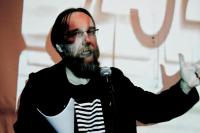Fourth Political Theory
In today's world, the impression is growing that politics has ended – at least the politics that we used to know. Liberalism stubbornly fought it out with its political enemies, which had offered alternative recipes – with conservatism, monarchism, traditionalism, fascism, socialism, and communism – and, finally, at the end of the 20th century, it beat them all. It would have been logical to surmise that politics would become liberal, while all of liberalism's opponents, having turned up on the periphery, would begin to rethink strategies and to form a new front: the periphery against the centre (Alain de Benoist). But at the beginning of the 21st century everything followed a different script.
Liberalism, having always insisted upon the minimization of the political, decided after its victory to countermand politics altogether, possibly in order not to allow formation of political alternatives and to make its rule eternal, or from the completion of the political discussions of the day due to the lack of enemies, who are necessary, according to Carl Schmitt, for the proper constitution of a political position. In any case, liberalism drove the matter to the wrapping up of politics. At the same time it itself changed, having moved on from the level of ideas, political programs and declarations and entered into the very make-up of social reality, which became liberal, not in a political but in a natural, every-day manner. As a consequence of such a turn of history, all the political ideologies that feuded passionately with one another over the last century lost their currency. Conservatism, fascism and communism, together with their secondary variations, lost; but liberalism, having won, quickly mutated into a way of life: consumerism, individualism, and a post-modern style of fragmented and sub-political being. Politics became bio-politics, redeployed on an individual and sub-individual level. It turns out that not only the defeated political ideologies but politics as such left the scene – including the liberal variant. For that reason, the formulation of alternatives is proliferating. Those who do not agree with liberalism found themselves in a difficult situation: the victorious enemy dissolved and disappeared; they're fighting with the air. How, then, is one to engage in politics, when politics is no longer?





